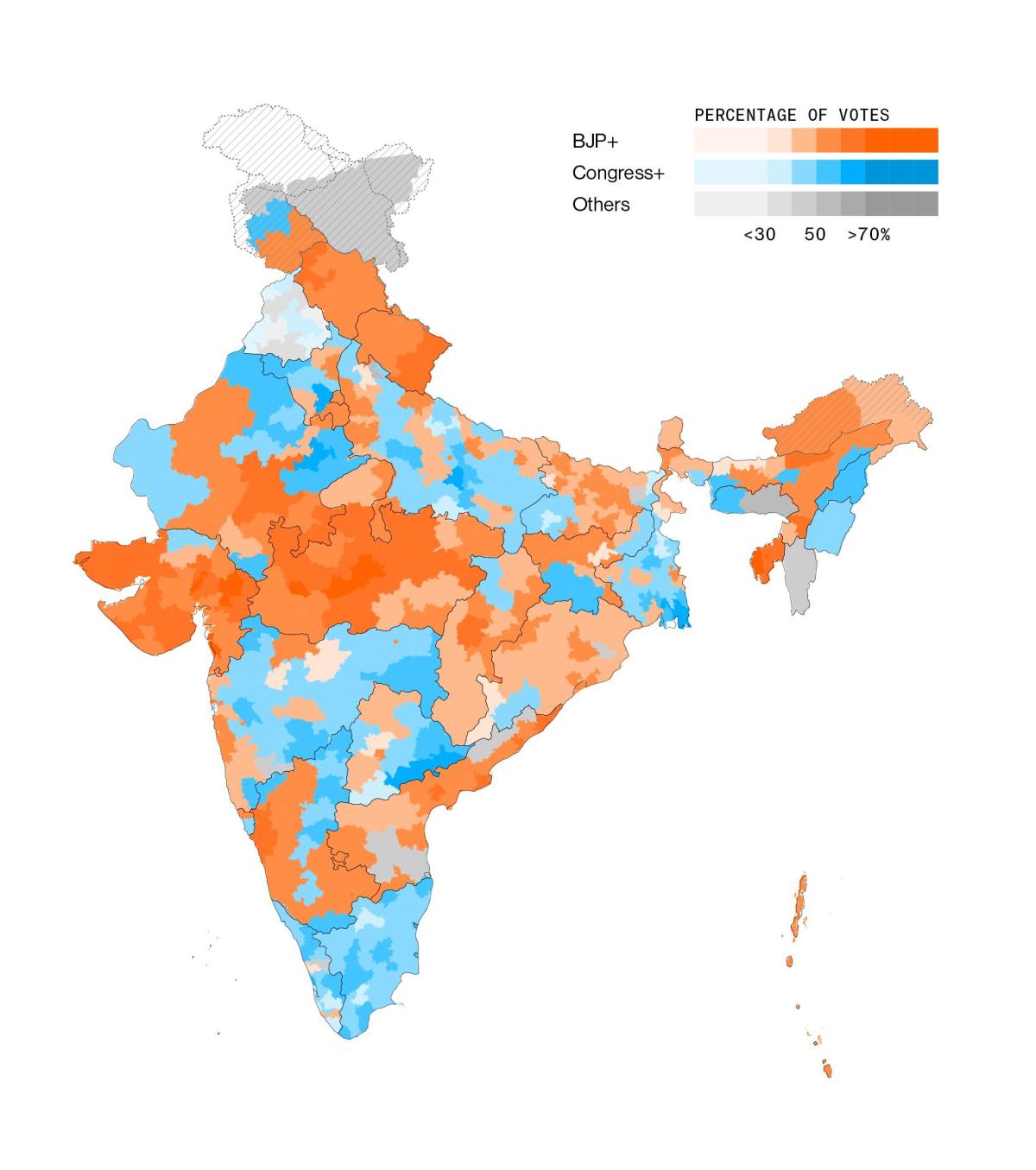(Bloomberg) — Indian Prime Minister Narendra Modi is gearing up for coalition talks after his party lost its majority in parliament, forcing him to rely on allies to form a government for the first time since he came to power a decade ago. to shape.
Most read from Bloomberg
Modi’s Bharatiya Janata Party must win the support of two regional, albeit notoriously unreliable, allies if it is to remain in power for a third term. The BJP-led National Democratic Alliance is expected to hold a rally in New Delhi on Wednesday afternoon.
Tuesday’s official results showed the BJP-led coalition has secured enough seats to form a government if it stays together, although the party fell short of the 272-seat majority on its own.
Modi claimed victory for his coalition, telling cheering supporters at his party headquarters that the “NDA has won a mandate to form the government” for a third straight term. “We are very grateful to the people who have full faith in the BJP and NDA,” he said.
“There will be a pound of flesh gained by the coalition partners, which will have policy implications,” said Irfan Nooruddin, professor of Indian politics at Georgetown University. “I think there will be a very serious reckoning for the BJP itself.”
The opposition alliance led by the Indian National Congress will also meet on Wednesday evening to shore up support from its partners and possibly find a path toward forming its own government.
Indian shares suffered their worst day in more than four years on Tuesday as it became clear that the election outcome would be much closer than expected. Markets hit a record high on Monday after exit polls over the weekend showed Modi would score an easy victory in the six-week marathon election. Before voting started on April 19, the prime minister had boldly predicted that his alliance would win as many as 400 seats.
Modi now needs to get the support of two key members of the NDA coalition, which controls about 30 seats – enough to tip the balance of power in parliament. The leaders of these two parties have a history of switching sides and only joined Modi a few months ago, making it unclear whether they will stick with him or support the opposition bloc. A spokesman for the allied Telugu Desam Party in the southern state of Andhra Pradesh confirmed support for Modi’s coalition.
The opposition bloc, led by the Congress party’s Rahul Gandhi, expanded its support by tapping into voters’ concerns about India’s growing inequality, widespread unemployment and rising costs of living.
The result is a stunning disappointment for the 73-year-old leader, who was the main face of the BJP’s election campaign and built the party mainly around himself. In addition to raising questions about Modi’s own future as prime minister, a weak coalition government will likely make it difficult for him to implement tough economic reforms or advance his Hindu nationalist agenda, assuming he returns to power.
The mediocre performance marks Modi’s first major setback in the national polls. He looked unbeatable in the run-up to the elections, buoyed by one of the world’s fastest growing economies and the fulfillment of key promises that appealed to India’s Hindu majority, including building a temple on the site of a 500-year-old mosque had stood. demolished.
Signs of trouble for Modi emerged after the first of seven rounds of voting. A drop in turnout led to a broad bid to win the vote, prompting Modi to take a sharper tone and inflame his Hindu nationalist base with divisive anti-Muslim rhetoric and attacks on the opposition’s welfare policies.
Many of the BJP’s alliance partners do not share the Hindu nationalist views that are at the core of the BJP agenda. That means the BJP could be forced to dial back some of its divisive rhetoric and set aside ambitions to more aggressively transform India into an openly Hindu nation. A weakened coalition could also force the BJP to offer cabinet posts and other concessions to alliance partners, while the coalition may struggle to implement ambitious economic reforms needed to boost growth.
Even with a reduced mandate or a change in government, India’s growth trajectory should remain largely positive. Business leaders from Elon Musk to Jamie Dimon have hailed India’s potential as an alternative to China, with some economists predicting that the country’s $3.5 trillion economy will collapse within the next five years could become the greatest contributor to global growth.
Modi’s weakened mandate “will make passage of controversial economic reforms more difficult,” said Shilan Shah, an economist at Capital Economics. The new government “could still do enough to keep potential growth at 6-7%,” he said. That would put the economy “on track to more than double in size over the next decade,” he predicted.
–With help from Dan Strumpf.
Most read from Bloomberg Businessweek
©2024 BloombergLP
